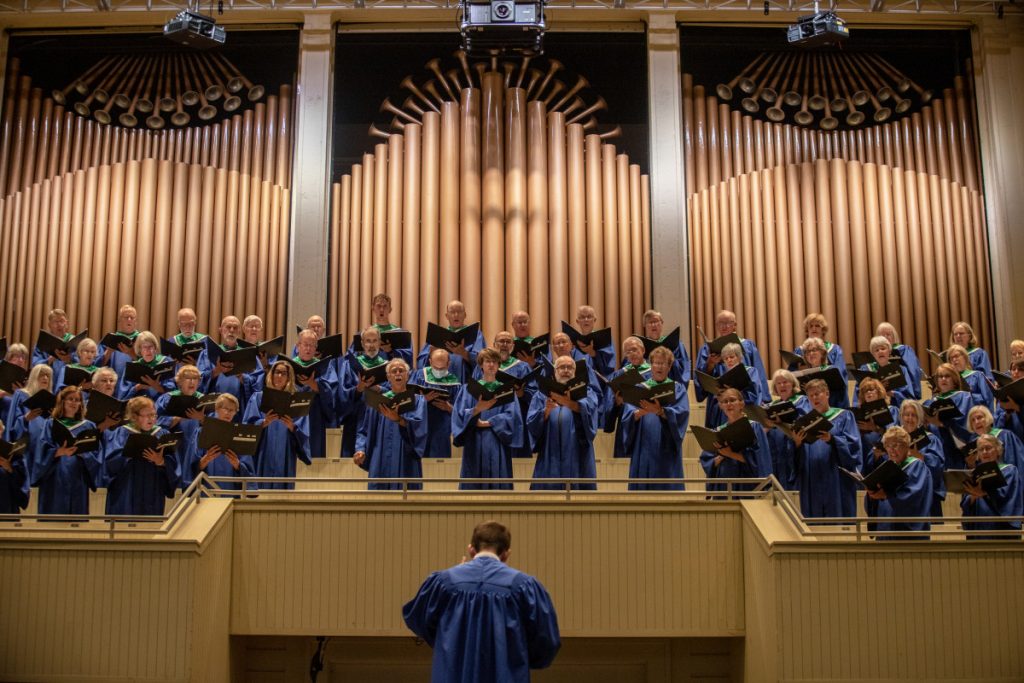
Mary Lee Talbot
Staff writer
A historian and archivist of Chautauqua Institution has said in reference to the program and our traditions: “We have always done it this way, except when we haven’t.” The time and place of the Sacred Song Service at 5 p.m. Sunday in the Hall of Philosophy and the concert by Diana Ross at 8:15 p.m. in the Amphitheater is such an occasion. The change was made in order to accommodate the possibility of Ross returning to Chautauqua on the only date free on her schedule.
The Sacred Song Service will be at 5 p.m. on Sunday in the Hall of Philosophy. The theme for the service is “The Spirituality of Delight.” Joshua Stafford, director of sacred music and Jared Jacobsen Chair for the Organist, had developed the service of music with anthems sung by the Chautauqua Choir and hymns sung by the congregation.
The spirit of delight can be found in the words of the hymns and the anthems that are part of this week’s service. The scriptures in the service will reflect on love of God, a life without worry and rejoicing in what is honorable, just, pure and pleasing.
“It’s My Desire,” by Freda Pullen Bagley and Horace Clarence Boyer, is about the desire to live for Jesus and the desire to help someone who is in trouble. Its chorus reads: “If you could see, where Jesus brought me from / to where I am today / Then you would know the reason why I love Him so.”
“His Eye is on the Sparrow,” was written by Civillia Durfee Martin. She was inspired by verses in the gospel of Matthew 6: 25-27. “His Eye is on the Sparrow,” begins with the recognition that even when the singer feels discouraged and lonely, Jesus is her companion. The chorus is “I sing because I’m happy, I sing because I’m free. His eye is on the sparrow and I know he watches me.”
Horatio Spafford, who wrote “It Is Well With My Soul,” went through a time of great tragedy. He lost his fortune in the Chicago fire of 1871, and shortly afterward his 4-year-old son died of scarlet fever. He sent his wife and four daughters to Europe to help them recover. The ship was involved in a collision then sank, and all four daughters died.
Spafford set sail for England and, as he passed over the spot where his daughters died, his mind was filled with these words of comfort. “When peace like a river, attendeth my way / When sorrows like sea billows roll / Whatever my lot, thou hast taught me to say / It is well, it is well, with my soul. / It is well / With my soul / It is well, it is well with my soul.”
Spafford and his wife, Anna, left their Presbyterian church in Chicago and began a house church which became the American Colony in Jerusalem. The group was dedicated to philanthropy without proselytizing and earned the respect of the Jewish, Christian and Muslim communities.
While the anthem on Sunday will use a setting by Craig Courtney, the original setting for “It Is Well With My Soul,” was written by Phillip P. Bliss. Bliss was a well-known writer of gospel hymns like “Hold the Fort.” He worked with evangelist Dwight L. Moody. Bliss came to Chautauqua at least twice before dying in the Ashtabula River Railroad Disaster. Bliss Avenue in Chautauqua is named for him.
Hymns during the service will include “Blessed Assurance” and “There’s a Sweet, Sweet Spirit” as well as the traditional “Day is Dying in the West” and “Now the Day is Over.” The service will end, as always, with “Largo” from George Frederic Handel’s opera Xerxes.




